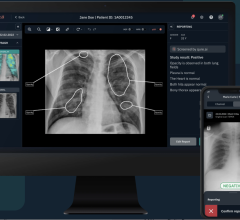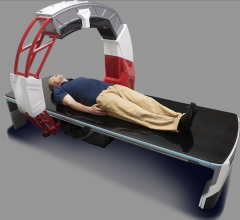November 10, 2014 — Medic Vision Imaging Solutions Ltd. will showcase its SafeCT Enterprise solution at the upcoming Radiological Society of North America's (RSNA's) 100th Scientific Assembly and Annual Meeting, Nov. 30 - Dec. 5 in Chicago. SafeCT is a turnkey solution pioneered to revitalize existing computed tomography (CT) scanners with CT image enhancement for low-dose scans to enable low-dose imaging with high-quality image results for diagnosis. This provides hospitals and imaging centers with a cost-effective option in place of a costly scanner retrofit or replacement.
The enterprise edition of SafeCT enables healthcare organizations to improve image quality on all CT scanners, regardless of disparate locations, through a cost-effective centralized approach. Similar to a centralized picture archive and communication system (PACS), the centralized SafeCT systems enables all CT scanners throughout the healthcare enterprise to provide the same image enhancement capabilities and standardized low-dose imaging protocols for all patients, while requiring only minimal investment in software and hardware.
At Massachusetts General Hospital (MGH), the dedication to the advancement of dose reduction strategies has been ongoing for nearly a decade. Physicians at MGH, the largest teaching hospital of Harvard Medical School, which conducts the largest hospital-based research program in the United States, have committed themselves to the goal of reaching the lowest possible radiation in CT scans, using advanced methods and technologies such as SafeCT. At this year's RSNA, leading experts from MGH will be highlighting their latest findings on the dose reduction capabilities and diagnostic performance of iterative reconstruction techniques that include the SafeCT solution from Medic Vision.
"Awareness of the necessity for low dose CT exams has grown among patients, physicians and the industry as a whole. The ability of CT scans to detect life-threatening conditions remains valuable, but our technologies must enable such functionalities while minimizing radiation exposure," said Sarabjeet Singh, M.D., lecturer in radiology, MGH, and Mannudeep Kalra, M.D., staff radiologist, MGH and associate professor, Harvard Medical School. "We have, and will continue to, work diligently to explore and identify solutions that maintain advanced image quality and enhance diagnostic assessment for radiologists – while ensuring significantly reduced dose to patients undergoing CT scans."
MGH physicians and staff will present a total of four presentations revealing the results of their low dose CT research during RSNA. The titles and times of the presentations are as follows:
- "Assessment of Image Based, Adaptive Statistical, and Model Based Iterative Reconstruction Techniques for Chest CT at Less than 1 mGy CTDIvol," Tuesday, Dec. 2, 9:35 a.m. - 9:45 a.m. CDT; Room S405AB.
- "Achieving Sub-milliSievert Radiation Dose: Prospective Randomized Clinical Study to Assess Ultra-low Dose Abdominal MDCT with a Three Dimensional Adaptive Iterative Reconstruction (AIDR) and Image-based Iterative Reconstruction (SafeCT)," Tuesday, Dec. 2, 10:30 a.m. - 10:40 a.m. CDT; Room E350
- "Comparison of Image Based, Adaptive Statistical, and Model Based Iterative Reconstruction Techniques for Substantial Dose Reduction for Abdominal CT,"Tuesday, Dec. 2, 10:40 a.m. - 10:50 a.m. CDT; Room E350.
- "Feasibility of Abdominal CT Scan at Sub Milli-Sievert Doses with Two Iterative Reconstruction Techniques: A Prospective Study," Wednesday, Dec 3, 3:00 p.m. - 3:10 p.m. CDT; Room E353C.
- For additional details on the sessions, click here. To learn more about Medic Vision's SafeCT Enterprise solution, visit the company at RSNA Booth 4335.
For more information: www.medicvision.com


 August 09, 2024
August 09, 2024 








